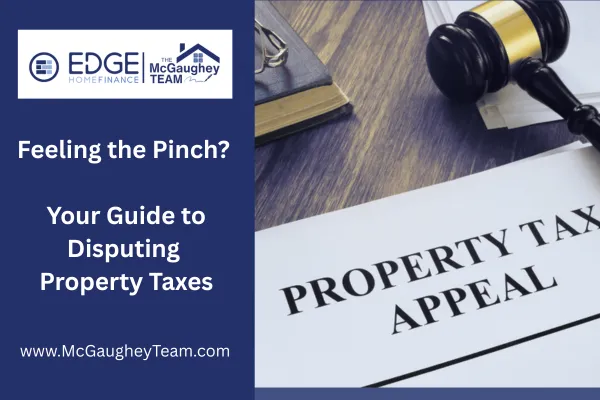Current Articles

Feeling the Pinch? Your Guide to Disputing Property Taxes
Feeling the Pinch? Your Guide to Disputing Property Taxes
That annual property tax bill can sometimes feel like a punch to the gut. You open the envelope, and a number stares back at you that makes you wonder, "Is my house really worth that much?" While property taxes are a necessary part of funding local services like schools and roads, that doesn't mean you have to blindly accept an assessment you believe is inaccurate.
The good news is that most jurisdictions offer a process for disputing your property taxes. It might seem daunting, but with a little preparation and understanding of the system, you could potentially lower your tax burden.
Why Might Your Assessment Be Wrong?
Several factors can lead to an inaccurate property tax assessment. These include:
Incorrect Property Information: Mistakes happen! The assessor's records might have the wrong square footage, number of bathrooms, or even the wrong lot size.
Overvaluation: The assessed value might simply be higher than the fair market value of your home compared to similar properties in your neighborhood. This could be due to outdated data or not accounting for recent market shifts.
Unequal Assessment: Your property might be assessed at a significantly higher percentage of its market value than comparable properties in your area.
Errors in Calculation: There could be mathematical errors in calculating your tax bill based on the assessed value and local tax rates.
Damage or Depreciation: Significant damage to your property (fire, flood, etc.) or general depreciation might not be reflected in the current assessment.
Your Step-by-Step Guide to Disputing Property Taxes:
Understand Your Assessment: The first step is to thoroughly review your assessment notice. Understand the assessed value of your land and any improvements (buildings). Look for any obvious errors in the property description.
Research Comparable Properties (Comps): This is crucial. Gather information on recent sales of similar properties in your neighborhood. Look for homes that are comparable in size, age, condition, and features. Online real estate portals and your local county assessor's website can be good starting points. Note the sale prices and dates of these comparable sales.
Gather Evidence: Compile any evidence that supports your claim of overvaluation or inaccuracy. This might include:
Photos of your property's condition, especially if it's not in prime shape.
Repair estimates for any significant issues.
Independent appraisals (if you've had one recently).
Data on comparable sales in your neighborhood.
Documentation of any incorrect property information in the assessor's records.
Contact Your Local Assessor's Office: Before formally filing an appeal, it's often a good idea to contact the assessor's office. Explain your concerns and present your preliminary findings. They might be willing to review your assessment and make an adjustment without a formal appeal process.
File a Formal Appeal: If contacting the assessor doesn't yield a satisfactory result, you'll need to file a formal appeal. Each jurisdiction has its own specific procedures and deadlines for filing an appeal, so be sure to get the correct forms and understand the timeline. This information is usually available on your local government's website or by contacting the assessor's office.
Prepare for Your Hearing (If Applicable): In many cases, you'll have the opportunity to present your case at a hearing or meeting with the assessment board or appeals body. Be prepared to clearly and concisely explain why you believe your assessment is incorrect and present your supporting evidence. Be respectful and professional.
Understand the Outcome and Your Options: After your appeal is reviewed, you'll receive a decision. If your appeal is successful, your assessed value and property taxes will be adjusted. If your appeal is denied, you may have further options for appeal, depending on your local laws. Understand these options and the associated deadlines.
Important Tips:
Act Quickly: There are usually strict deadlines for filing appeals. Don't delay!
Be Organized: Keep all your documents and correspondence organized.
Be Respectful: Even if you disagree with the assessment, maintain a respectful and professional demeanor throughout the process.
Know Your Rights: Familiarize yourself with your local property tax laws and appeal procedures.
Consider Professional Help: If your situation is complex or involves a significant amount of money, you might consider consulting with a real estate attorney or a property tax consultant.
Disputing your property taxes can be a worthwhile endeavor if you have legitimate grounds to believe your assessment is inaccurate. By understanding the process, gathering solid evidence, and presenting your case effectively, you can potentially save yourself money and ensure your property taxes are fair. Don't just accept the bill – take the time to investigate and advocate for yourself!

Thank you for choosing us. We are dedicated to helping you achieve your home-ownership dreams with personalized service and expert guidance. For more information or assistance, feel free to reach out to us anytime!
My Contact
(817) 798-2853
800 E Border St, Ste 500,
Arlington Texas 76010
Branch NMLS 2665932
Service Areas:
Abilene, Arkansas, Arlington, Austin, Bedford, Bryan, College Station, Colleyville, Coppell, Carrollton, Dallas, Denton, Euless, Fayetteville, Flower Mound, Fort Worth, Frisco, Garland, Grand Prairie, Grapevine, Haltom City, Haslet, Hurst, Irving, Keller, Las Colinas, Lubbock, Mansfield, North Richland Hills, Plano, Richardson, Richland Hills, Roanoke, Saginaw, San Antonio, Southlake, Tarrant County, Texas, Waco, Watauga, & Weatherford.
Sean McGaughey with The McGaughey Team | NMLS 627960
Edge Home Finance | EHFC NMLS 891464 | Equal Housing Opportunity
© Copyright Edge Home Finance 2025. All Rights Reserved. Created by Magik Digital



